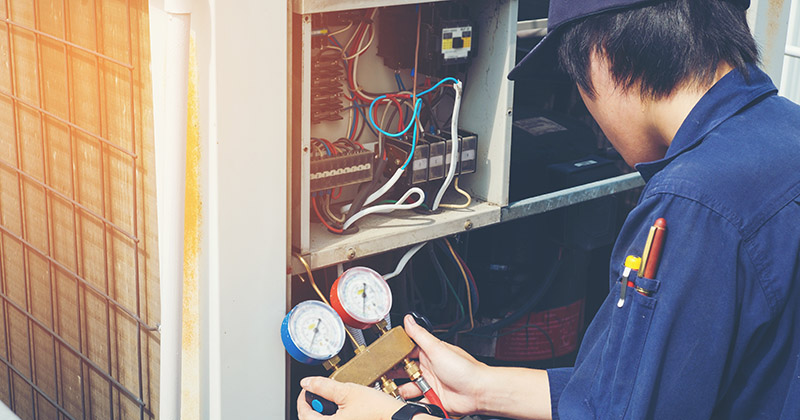
Does your HVAC company offer maintenance service contracts? If your answer is “no,” you’re missing out on incredible earning and growth opportunities.
An HVAC service or maintenance contract is an agreement between provider and client for ongoing HVAC system maintenance. Most contracts are annual, charged monthly, quarterly, or yearly.
The beauty of an HVAC service contract is that it benefits both the business and the customer.
For one thing, the customer gets continued preventative maintenance. This prolongs their HVAC equipment’s lifespan. It also minimizes HVAC repairs, breakdowns, and interruptions, making for substantial cost savings.
For another, selling HVAC contracts can be a clever strategy to run and grow your business. HVAC maintenance contracts lock in long-term customers. Repeat business from these contracts brings consistent cash flow. It also helps retain customers and creates growth opportunities.
That’s all very well. The trick is convincing your one-time HVAC customers to commit to your company long-term. But don’t worry, we’ve got that covered.
This article will show you how to sell HVAC maintenance contracts. It covers the following points:
- How to pitch your HVAC maintenance contract to potential customers
- The service options to include in an HVAC contract to make it more appealing
- How to bundle and upsell HVAC service packages
- Tips for closing an HVAC service deal
- Is it a good idea to offer service contracts to commercial HVAC clients?
Read on and learn the tips and tricks for making HVAC service agreement sales.
FROM ONE OF OUR PARTNERS: How to Scale Your HVAC Business
Offer Choices for HVAC Contracts

The “HVAC Contractor Business Model” is a publication created by the Office of Energy Efficiency and Renewable Energy (EERE). It demonstrates how selling HVAC service contracts boosts business performance.
Contracts should be about building lasting customer relationships. If those relationships are your primary concern, stabilizing income flow will follow. You can start by leveraging your existing customer base for business growth.
However, one or two HVAC service contracts won’t do. The EERE estimates that you need to sign about 500 service agreements to make your HVAC business sustainable.
How do you sell 500 HVAC maintenance contracts?
First, don’t let that figure scare you—500 is just an average baseline. The point is the more service contracts you sell, the better.
Selling HVAC contracts begins with designing contracts customers would want to buy. Also, each agreement must bring meaningful value to your company.
Here are five options you should include in your HVAC service agreements. These points make them attractive to customers and beneficial to your business:
Customer Incentives
Give customers enough reason to buy an HVAC service contract. Try the following incentives to get customers to sign up for ongoing HVAC services:
- Discounts on scheduled preventative maintenance for cooling, heating, and AC systems
- Deals on equipment replacements and upgrades
- Guaranteed emergency response
- Exclusive club or loyalty membership
- Priority services
- 24/7 service calls
Such incentives are powerful selling points for HVAC contracts. Study your customers’ needs and design an HVAC service deal they’ll find irresistible.
Flexible Terms
Let your customers choose the options and terms they’d like included in the contract. Allow for as much customization as possible.
For example, you can have customers select the following:
- Preferred HVAC maintenance schedules
- Payment plans
- Terms of engagement.
- Tiered packages ranging from basic to premium.
Keep in mind that HVAC services are not one-size-fits-all. Different clients will have different needs and preferences when it comes to maintaining HVAC systems. A rigid service contract may lock out customers who find the terms irrelevant or impractical.
On the other hand, flexible and customizable terms ensure that the agreement caters to every customer’s needs.
Upsell Opportunities
Offering HVAC maintenance contracts is a great way to upsell HVAC services to existing customers. It’s quite effective too. Did you know there’s a 60-70% chance of selling to an existing customer? Compare that to a 5-20% probability of selling to a new prospect.
Establishing trust with an existing client makes upselling an HVAC service contract easier. However, ensure the customer sees it as an opportunity for better services.
For instance, a particular client frequently calls your company to fix their broken heating and cooling system. You could recommend ongoing maintenance as a solution to their break-fix cycle.
Referral Program
Design an HVAC contract that not only boosts repeat business but also sells itself. Then, encourage existing customers to promote more HVAC contracts through a referral program.
According to Nielsen’s 2021 Trust in Advertising Study, 88% of consumers trust recommendations from people they know.
Customers who’ve already signed up for your HVAC service can sell more contracts than you ever can. You simply have to motivate them to spread the word about your HVAC contract. Generous referral discounts should do the trick.
Embedding a referral program into an HVAC contract encourages word-of-mouth advertising. This is the most effective way to build a trusting customer base—trusting enough to sign HVAC contracts.
Bundle and Upsell HVAC Maintenance Packages

We mentioned bundling and upselling HVAC contracts. What exactly does that mean?
Let’s take a step back and look at the anatomy of an HVAC service contract. A typical HVAC contract comprises these four components:
1. Rendered services. Rendered services usually include routine maintenance practices for heating, cooling, and air conditioning systems, such as:
- Changing air filters
- Checking refrigerant levels and topping up if necessary
- Checking for overall wear and tear while replacing damaged or worn parts
- Lubricating moving components
- Checking for frayed belts and wires
- Checking and addressing leaks
- Cleaning vents and drain lines
- Removing clutter around the outdoor unit
- Inspecting the thermostat
2. Maintenance schedule. The contract should outline the number and frequency of HVAC maintenance visits during an agreed period. Depending on the client’s HVAC system, they could need monthly, quarterly, or yearly visits. Included in the scheduling details is a service checklist for each visit.
3. Pricing and payment plans. Pricing is another crucial component of an HVAC service contract. No client wants an unexpected bill. So, every service charge must be clear and summed up in the total cost.
The pricing structure is really up to you and what works best for your customers. For instance, you can have an all-inclusive price for the contract or bill the client on a per-visit basis.
Also, discuss payment terms with the client. Find and agree on the most convenient billing and payment plan.
4. Value-added perks. Why would a customer want to sign your HVAC contract? There must be something in it for them.
An HVAC maintenance agreement should have value-added perks. Perks can be discounts, rebates, and exclusive services. These are essential selling points for your HVAC service contract.
This may sound like a lot to keep track of, but consider using HVAC service management software. It can be a very helpful tool in managing the elements of your HVAC contracts.
How to Bundle HVAC Services
Bundling HVAC services means combining all the above components into tiered subscription packages. That way, your HVAC contract has different service levels to meet the needs of different customers. Price each package according to its service scope. Customers can then choose how much they want to spend.
Moderate price breaks make HVAC service bundles more appealing to customers. But, due to repeat business, they’re also profitable.
Upselling HVAC Service Packages
It’s common to have first-time customers sign up for the most basic HVAC service bundle. That’s usually the entry point for most HVAC contracts. But with some nurturing, you can gradually elevate them to higher subscription levels.
That’s where upselling comes in.
You don’t want to come off as pushy. Pitch your upsell by explaining how spending just a little more yields so much more value. Effective upselling is best done on an individual basis.
In other words, truly consider what each customer needs. Recommend higher service packages to specific customers who would actually benefit from them. That’s how you upsell HVAC services without being overbearing.
For instance, while in the field, technicians can subtly suggest perks in other subscription packages that would be useful or relevant to the particular client.
FROM ONE OF OUR PARTNERS: 3 Ways to Turn One-Time Customers Into Lifetime Customers
What About Commercial HVAC Service Contracts?

Both commercial and residential HVAC systems serve the same basic purposes. They keep heating, cooling, and ventilation in working order. However, the two differ widely in size, complexity, and maintenance requirements.
Commercial HVAC systems are more demanding when it comes to maintenance and upkeep. For that reason, commercial HVAC jobs pay more than residential HVAC jobs.
Commercial HVAC clients are usually more willing to sign long-term service contracts. They want to take advantage of economies of scale and other perks.
That sounds pretty enticing. But can a residential HVAC service provider serve in the commercial market? They certainly can.
However, commercial HVAC work can differ greatly from what you’re used to. Below is a head-to-head comparison between commercial and residential HVAC Work.
| Residential HVAC Work | Commercial HVAC Work |
| Smaller units are typically installed outside on the ground, making them easy to access. | Most commercial HVAC systems are installed on rooftops. They’re also much larger in scale. |
| A small crew or even one technician is enough to undertake all service procedures | Requires a more capable crew and technicians trained in servicing commercial HVAC systems. |
| Does not require specialized equipment, tools, or work gear. | May require specialized equipment, tools, and gear, depending on the HVAC system being serviced. |
| Residential HVAC units are split between indoor and outdoor components that cannot be easily modified or expanded. | Commercial HVAC systems are modular, allowing easy access, scaling, and modifications. |
The Pros and Cons of Commercial HVAC Service Contracts
Like with all business models, there are two sides to offering commercial HVAC service contracts. Here are the pros and cons of commercial HVAC jobs:
The Pros
- High-paying service contracts
- More effective referral marketing
- Having commercial HVAC clients in your portfolio can boost your brand’s credibility
- Usually involve long-term contracts, even exceeding one year
- Commercial HVAC service contracts can lead to strategic business partnerships
The Cons
- May require training your crew in new skills. Or hiring new workers experienced in servicing commercial HVAC systems
- Some commercial clients require a dedicated account manager or contact person
- Payment delays are common
- You may need specialized equipment or tools
- Signing a new client can be a lengthy process, especially where there are multiple decision-makers involved
FROM ONE OF OUR PARTNERS: The Best HVAC Technician Training Programs in the U.S.
Practice Your HVAC Service Contract Sales Pitch

Selling HVAC service contracts can be challenging. It calls for patience, marketing know-how, and a sharp eye for potential sales opportunities. But the good news is; all that effort is well worth the reward.
It doesn’t matter whether you’re dealing with residential or commercial HVAC jobs. You’ll need a convincing pitch to get customers interested in signing an HVAC service contract.
Here are the top five tips for pitching HVAC maintenance contracts to new prospects:
Target the Right Customers
Not every HVAC customer is ready or willing to buy an HVAC service contract. A prime target for the pitch would be a client who has already engaged with your company at least once.
Purchasing an HVAC contract requires trust and familiarity. Having previous experience with the customer gives you enough information to personalize the pitch. Proposing a long-term commitment on first contact might scare new customers off.
Empathize With Your Client’s Biggest Pain Points
Don’t use a cookie-cutter sales pitch. Take your time to understand the customer’s HVAC pain points. From there, you can center your pitch around offering relevant HVAC solutions.
Pitching mainly involves changing the customer’s perspective on continuous HVAC maintenance. Understandably, some might see it as a waste of money. Shift this mindset. Highlight the many benefits of signing an HVAC contract that far outweigh the perceived cost.
Send a Detailed Quote
Send the customer a detailed summary of the contract. The prospect will likely want to know how much the contract will cost, the services rendered, and the available perks.
Also, list the various service packages, prices, and scope details. You can even draft personalized service quotations based on the client’s HVAC system.
Focus on the Expected Outcomes
Focus on what the HVAC contract represents from the customer’s perspective. Draw the customer’s attention to the meaningful value in the contract. What exactly does the customer get out of the deal?
Generally, customers enjoy the following benefits from preventative HVAC maintenance:
- Cost savings on break-fix HVAC repairs
- Minimal HVAC downtime
- Extended lifespan of HVAC systems
- Dependable and safe heating, cooling, ventilation, and air conditioning
- Energy saving thanks to smooth and efficient running of HVAC systems
- High-quality indoor atmosphere
The phrase “preventative HVAC maintenance” might not mean much to your prospects. Instead of using industry lingo, speak to customers in a language they’ll understand.
Utilize Modern Marketing Techniques
Tap into modern marketing strategies to get customers interested in your HVAC service contract. For instance, reach out to potential buyers via social media and email marketing. These are less intrusive yet direct ways to communicate with customers than marketing calls.
FROM ONE OF OUR PARTNERS: Digital Marketing for HVAC Companies
5 Tips for Closing HVAC Service Agreement Sales
After pitching, you need to convince customers to close the deal. And even that takes a bit of finesse. Here’s how you close an HVAC service contract agreement:
Follow up on Leads
Some customers need reminders to make a purchase decision. Check in on your HVAC service contract leads regularly. You can use email, phone calls, or snail mail. Remind them of the benefits they’re missing out on by sitting on the contract.
Meet the Client Halfway
Have you noticed that a particular client is willing but a bit hesitant to close the deal? Try lowering the bar for them. Doing so might motivate them to make the leap.
For instance, you could reduce the fee for the first contract or offer a trial run. You might even develop an individualized service package.
Be Patient but Persistent
Give your customers all the time they need to build trust with your brand. Then they’ll realize the value of your HVAC maintenance agreement. Commercial HVAC clients are particularly slow at making long-term partnerships with other companies. So, be patient.
But keep on pushing the prospects closer to a purchase decision. Just maintain a respectable distance so you don’t appear desperate for an HVAC contract.
Invite Counteroffers
Open the negotiation table and hear out your prospects. Negotiating can be especially fruitful when dealing with big commercial clients. Find common ground without compromising the contract’s profitability or quality of service.
Demonstrate Social Proof
Most customers like to see social proof before making a purchase. That’s why 81% of customers use Google reviews to evaluate local businesses. Social proof might be the final nudge a customer needs to sign an HVAC service agreement. This can be in the form of customer reviews, testimonials, referrals, case studies, etc.
FROM ONE OF OUR PARTNERS: Online Reviews for Businesses
Related Posts
Top 40 Must-Have Plumbing Tools
Continue ReadingService Fusion Edge: The Smarter Way to Save, Learn, and Grow. All for Free.
Continue ReadingStay Informed
Get the latest news and insights plus, Service Fusion offers and updates.Thank you for your submission.
SHARE